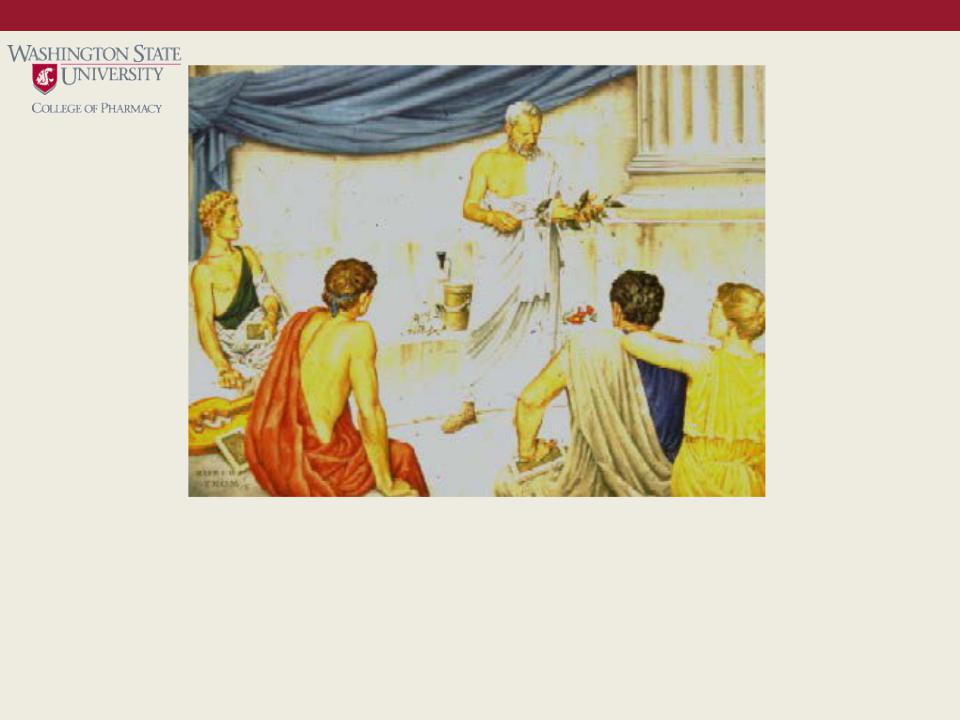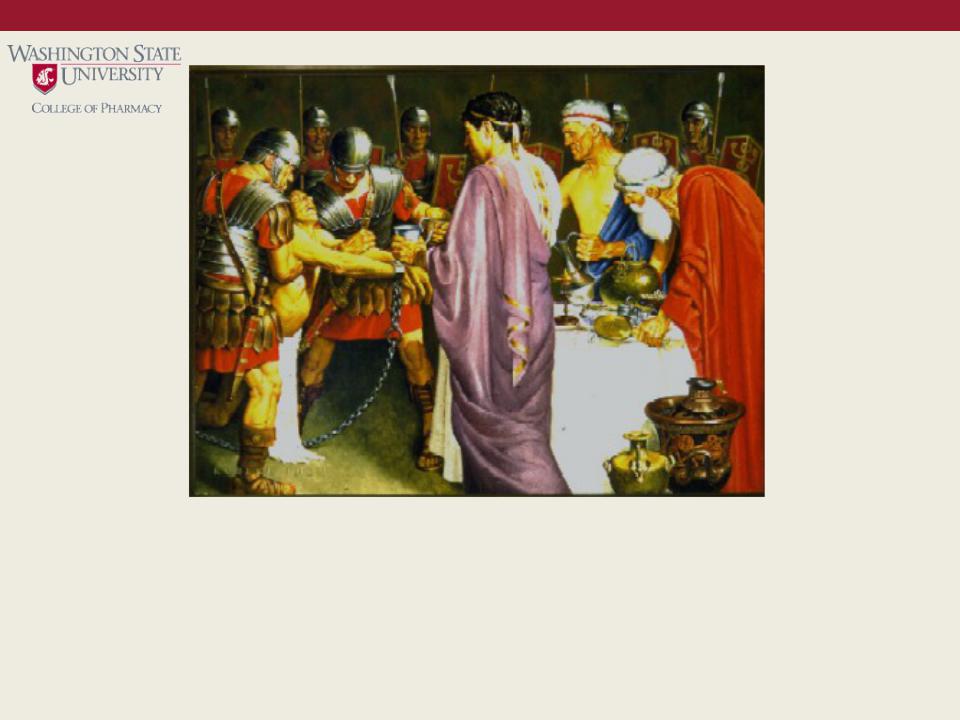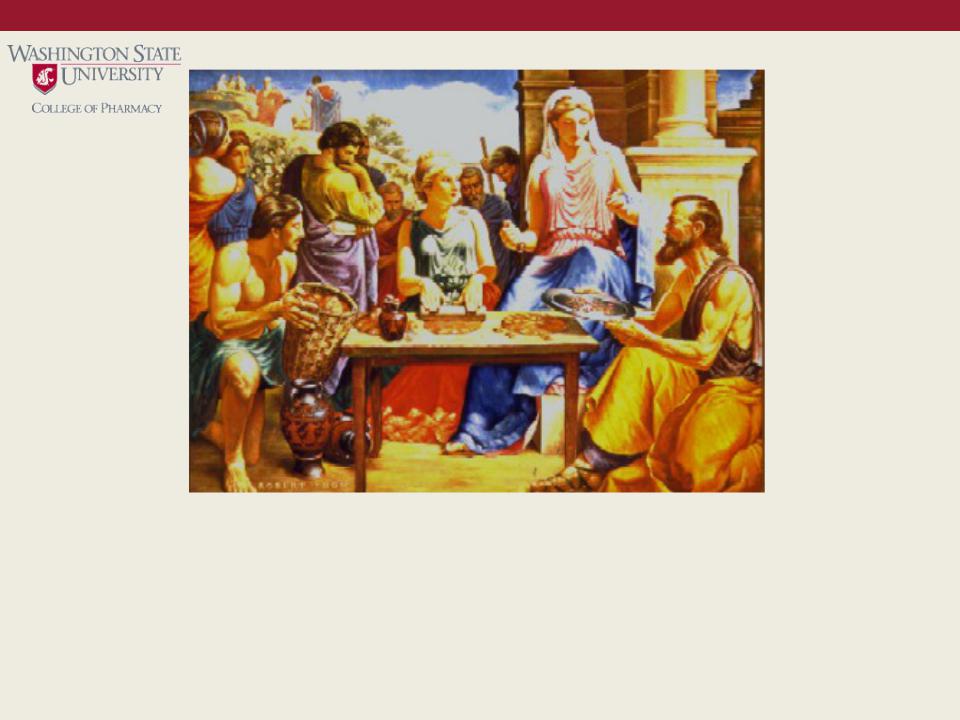
- •1. Before the Dawn of History
- •2. Pharmacy in Ancient Babylonia
- •3. Pharmacy in Ancient China
- •4. Days of the Papyrus Ebers
- •5. Theophrastus – Father of Botany
- •6. The Royal Toxicologist – Mithridates VI
- •7. Terra Sigillata – An Early “Trademarked” Drug
- •8. Dioscorides – A Scientist Looks at Drugs
- •9. Galen – Experimenter in Drug Compounding
- •10. Damian and Cosmas – Pharmacy’s Patron Saints
- •11. Monastic Pharmacy
- •12. The First Apothecary Shops
- •13. Avicenna – The “Persian Galen”
- •14. Separation of Pharmacy and Medicine
- •15. The First Official Pharacopeia
- •16. The Society of Apothecaries of London
- •17. Louis Hébert, Apothecary to New France (Canada)
- •18. The Governor who Healed the Sick
- •19. The Marshall Apothecary
- •20. First Hospital in Colonial America
- •21. Scheele – Greatest of the Pharmacists-Chemists
- •22. Craigie – America’s First Apothecary General
- •23. Sertürner – First of the Alkaloid Chemists
- •24. Caventou, Pelletier and Quinne
- •25. American Pharmacy Builds its Foundations
- •26. The Shakers and Medicinal Herbs
- •27. The American Pharmaceutical Association
- •28. European and American Pharmacy Meet
- •29. The Father of American Pharmacy
- •30. A Revolution in Pharmaceutical Education
- •31. The Pharmacopeia Comes of Age
- •32. The Standardization of Pharmaceuticals
- •33. Wresting the Jungle’s Secrets
- •34. Stanislas Limousin – Pharmacal Inventor
- •35. The Era of Biologicals
- •36. The Development of Chemotherapy
- •37. Pharmaceutical Research
- •38. Pharmaceutical Manufacturing Comes of Age
- •39. The Era of Antibiotics
- •40. Pharmacy Today and Tomorrow

5. THEOPHRASTUS – FATHER OF BOTANY
Theophrastus (about 300 B.C.), among the greatest early Greek philosophers and natural scientists, is called the "father of botany." His observations and writings dealing with the medical qualities and peculiarities of herbs are unusually accurate, even in the light of present knowledge. He lectured to groups of students who walked about with him, learning of nature by observing her treasurers at firsthand. In his hands he holds a branch of belladonna. Behind him are pomegranate blooms, senna, and manuscript scrolls. Slabs of ivory, coated with colored beeswax, served the students as "slates." Writing was cut into the surface with a stylus.

6. THE ROYAL TOXICOLOGIST – MITHRIDATES VI
Mithridates VI, King of Pontus (about 100 B.C.), though he battled Rome for a lifetime, found time to make not only the art of poisoning, but also the art of preventing and counteracting poisoning, subjects of intensive study. Unhesitatingly, he used himself as well as his prisoners as "guinea pigs" on which to test poisons and antidotes. Behind him are rhizotomists, offering fresh, flowering aconite, ginger, and gentian. At lower right is a crater - a two-piece forerunner of the champagne bucket. His famed formula of alleged panantidotal powers, "Mithridatum," was popular for over a thousand years.

7. TERRA SIGILLATA – AN EARLY “TRADEMARKED” DRUG
Man learned early of the prestigious advantage of trademarks as a means of identification of source and of gaining customers' confidence. One of the first therapeutic agents to bear such a mark was Terra Sigillata (Sealed Earth), a clay tablet originating on the Mediterranean island of Lemnos before 500 B.C. One day each year clay was dug from a pit on a Lemnian hillside in the presence of governmental and religious dignitaries. Washed, refined, rolled to a mass of proper thickness, the clay was formed into pastilles and impressed with an official seal by priestesses, then sun-dried. The tablets were then widely distributed commercially.

8. DIOSCORIDES – A SCIENTIST LOOKS AT DRUGS
In the evolution of all successful and enduring systems of knowledge there comes a time when the observations of many men, or the intensive studies of one, transcend from the level of trade or vocation to that of a science. Pedanios Dioscorides (first century A.D.), contributed mightily to such a transition in Pharmacy. In order to study materia medica, Dioscorides accompanied the Roman armies throughout the known world. He recorded what he observed, promulgated excellent rules for collection of drugs, their storage and use. His texts were considered basic science as late as the sixteenth century.
